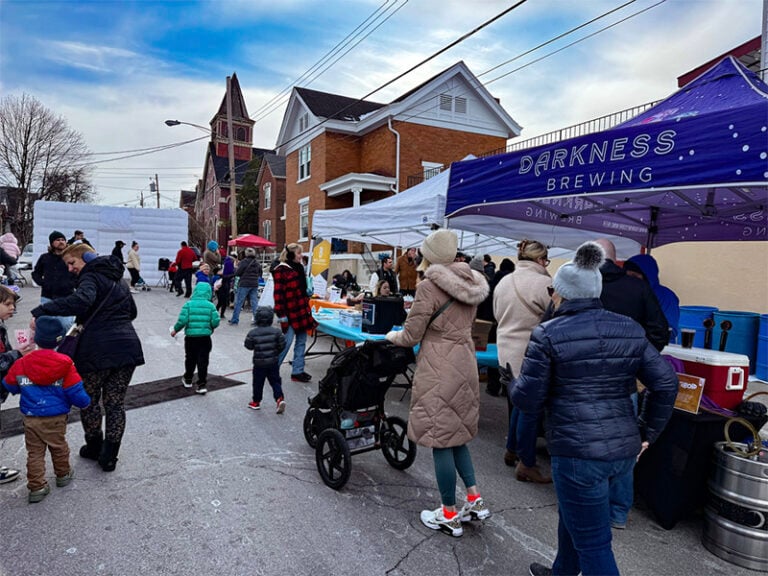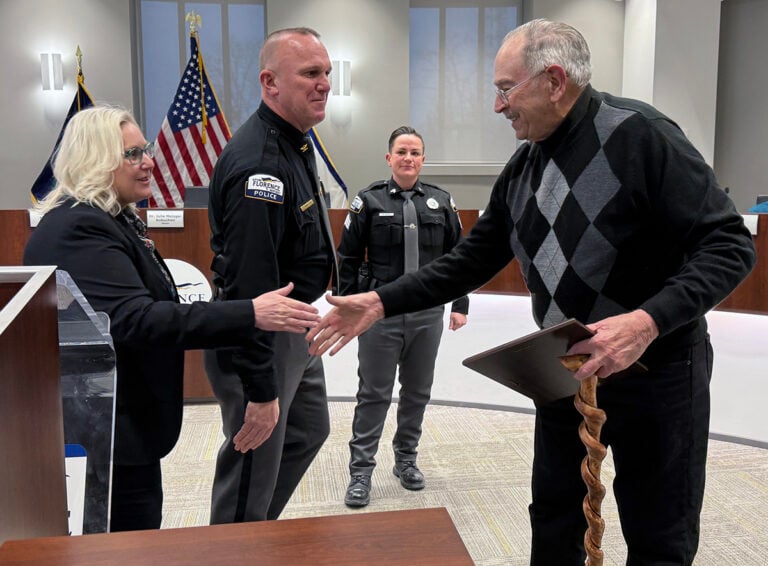The state Senate has passed legislation banning breweries from owning beer distribution networks – a move expected to force Anheuser-Busch to sell its two Kentucky distributorships.
The legislation, known as House Bill 168, passed with a 23-13 vote – ending what has been dubbed the “beer wars” in the General Assembly. HB 168 would affirm that the state’s three-tier system of regulating alcoholic beverage producers, distributors and retailers applies to beer.
“HB 186 is about the three-tier system in regards to alcohol distribution in the state of Kentucky,” said Sen. John Schickel, R-Union. “A three-tier system specifically prevents interlocking ownership between the tiers. The three-tier system prevents monopolies, but to be effective, the tiers must be independent of one another.”
He said 37 other states have endorsed the three-tier system and none of those governments has given into Anheuser-Busch’s request to deregulate the beer business.
“Anheuser-Busch wants a monopoly, not a free market,” Schickel said.
He said a diverse group of special interests joined forces to support HB 168. The groups included breweries such as Yuengling & Son and MillerCoors, business groups like the Bowling Green Area Chamber of Commerce and the Greater Lexington Chamber of Commerce, and the Temperance League of Kentucky.
“HB 168 is perfectly consistent with the historical approach Kentucky has taken with alcohol regulation.” — Sen. John Schickel, R-Union
“HB 168 is perfectly consistent with the historical approach Kentucky has taken with alcohol regulation,” Schickel said. “For good reason, the alcohol beverage industry has always been highly regulated. That goes all the way back to Prohibition when the alcohol industry was taken over by organized crime. When we came out of Prohibition, we wisely established the three-tier system in Kentucky.”
Opponents to the bill included Sen. Julie Raque Adams, R-Louisville, where Anheuser-Busch owns one of its two Kentucky distributorships.
“Make no mistake; House Bill 168 is a punitive bill that seeks to punish Anheuser-Busch,” she said. “It retroactively takes from Anheuser-Busch what they lawfully obtained. It will require divestiture of its assets. This bill is the ultimate assault on private property rights.”
She said no one in the chamber could claim victory with the passage of HB 168, especially when it comes to Anheuser-Busch’s almost 200 employees, many of whom live in and around the district she represents in Louisville.
Sen. Joe Bowen, R-Owensboro, also spoke out against the bill. He lives in the city where Anheuser-Busch’s second distributorship is located. He said HB 168 “pulls the rug out from under” Anheuser-Busch.
“This bill tinkers with the free market,” Bowen said. “It tinkers with the laws and structures of a free-market economy. It is in violation of the laws of a free market.”
He said its “inappropriate” for the state Senate to intervene on what he characterized as a business dispute.
Bill supporter Sen. Julian M. Carroll, D-Frankfort, gave a floor speech that contained a history lessons on beer distributorships in Kentucky.
When Carroll was governor in 1978, he said his administration wrote regulations to preserve the three-tier system after Anheuser-Busch purchased its first distributorship in Louisville. That system was again jeopardized when a court ruled last year that Anheuser-Busch could own the second distributorship in Owensboro.
“I apologize for my failure to take care of this problem in 1978,” Carroll said, “and ask for forgiveness.”
The bill now heads to the governor’s desk.
A bill that would require the state to post a list of all Kentucky stroke hospitals and stroke centers online and distribute the list to local emergency services providers is on its way to becoming law.
Senate Bill 10, sponsored by Sen. Stan Humphries, R-Cadiz, and Senate President Pro Tem David Givens, R-Greensburg, received final passage in by a vote of 99-0 in the House. It now goes to the governor for his signature.
Specifically, the bill would require that a list of all acute stroke ready hospitals, comprehensive stroke centers, and primary stroke centers in Kentucky be posted to the web site of the Cabinet for Health and Family Services and be distributed to emergency medical services providers, whose directors would be required to create protocols for assessment and treatment of stroke patients before the patients reach the hospital.
The bill would also expand the types of stroke-care certification available to hospitals across the Commonwealth, building on a 2010 law that requires Kentucky to recognize certified primary stroke centers.
Kentucky currently has two comprehensive stroke centers—one at the University of Louisville and one at the University of Kentucky—and around 21 total certified stroke hospitals, according to Rep. David Watkins, D-Henderson, who presented SB 10 for a vote in the House.
“Having a stroke system of care in Kentucky is an important component of our health care delivery system,” said Watkins, a physician. “I feel like this is an extremely good bill.”
The Cabinet reports that stroke accounted for two percent, or 12,024, of all hospitalizations in Kentucky in 2010, and that Kentucky had the 11th highest stroke death rate in the country in 2009.
SB 10 passed the Senate unanimously on Feb. 5.
Health insurers would have to cover the cost of follow-up procedures resulting from a colorectal cancer screening under a bill that is now on its way to the governor’s desk.
Senate Bill 61, sponsored by Sen. Ralph Alvarado, R-Winchester, received final passage by a 95-5 vote in the House. It would require insurers to cover any follow-up colonoscopy resulting from a colorectal cancer screening without imposing additional deductible or coinsurance costs.
The bill would apply to health benefit plans issued or renewed on or after Jan. 1, 2016, should it become law.
The House passed similar legislation earlier this session. That bill, House Bill 69 sponsored by House Health and Welfare Committee Chair Rep. Tom Burch, D-Louisville, passed the House by a 66-29 vote on Feb. 9.
Like HB 69, “it removes the barriers for colorectal cancer screening,” Burch told the House before presenting SB 61 for a final vote.
SB 61 passed the Senate on a vote of 31-3 on Feb. 19.
The state Senate Committee on Transportation approved three state House bill on topics ranging from special license plates, classic cars and mobile methamphetamine labs.
The first piece of legislation taken up by the committee, House Bill 209, would create a special license plate for Kentuckians with a sibling who died in active U.S. military service. Rep. Diane St. Onge, R-Lakeside Park, a sponsor of the bill, said the plate would be known as the “Gold Star Siblings” special license plate.
The initial fee for a Gold Star Siblings license plate would be $25 and the renewal fee would be $20, with $10 of the initial fee and $5 of the renewal fee dedicated to the state’s Veterans’ Program Trust Fund, St. Onge said.
The second piece of legislation deals with vehicles that are turned in mobile methamphetamine labs. Known as House Bill 19, it would require the vehicles to be crushed at the junk yard after the completion of any criminal investigation, said Rep. Hubert Collins, D-Wittensville.
“We are running into a lot of older cars which are being used to manufacture meth in,” said Collins, a sponsor of the bill. “We know once that is manufactured in them they are never safe again.”
A third bill, House Bill 20, involves property taxes on classic cars. It would prevent tax appraisers from assuming a car 20 years or older has been maintained at original factory condition or restored. Appraiser would have to assess the value of the car using a formula established in HB 20 and only after a physical inspection or viewing photographs of the vehicle
“Tax appraisers think some of these older cars we have out there are immaculate like the ones you see on reality shows about car restorers,” said Collins, also a sponsor of HB 20.
All three bills will now go to the full Senate for consideration.
The Kentucky Legislature Home Page, www.lrc.ky.gov, provides information on each of Kentucky’s senators and representatives, including phone numbers, addressees and committee assignments. The site also provides bill texts, a bill-tracking service, and committee meeting schedules.
To leave a message for any legislator, call the General Assembly’s Message Line at 800-372-7181. People with hearing difficulties may leave messages for lawmakers by calling the TTY Message Line at 800-896-0305.
You may also write any legislator by sending a letter with the lawmaker’s name to: Capitol Annex, 702 Capitol Avenue, Frankfort, Kentucky 40601.
From Legislative Research Commission


















